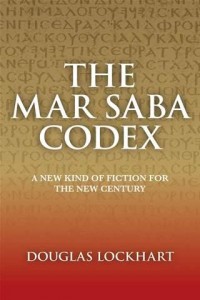Review: The Mar Saba Codex
 Within the first few weeks of my moving to Hobart I happened to find myself at a book launch that someone had pointed out to me in the local newspaper. The event involved a local author writing on religious issues, and it also involved wine and a professor of philosophy at the nearby university. It intrigued me enough to go. The speech by the author, Douglas Lockhart, exhorted the church to redefine itself and its doctrine to be more reasonable, and intrigued me enough to buy the ebook.
Within the first few weeks of my moving to Hobart I happened to find myself at a book launch that someone had pointed out to me in the local newspaper. The event involved a local author writing on religious issues, and it also involved wine and a professor of philosophy at the nearby university. It intrigued me enough to go. The speech by the author, Douglas Lockhart, exhorted the church to redefine itself and its doctrine to be more reasonable, and intrigued me enough to buy the ebook.
There is a companion volume of philosophical theory and The Mar Saba Codex was consequently touted as being fast-paced, suspenseful, with interesting characters in interesting places. Although I wasn’t expecting anything Dan Brown-esque I was hoping to find something with some grip and engagement. I was a little disappointed. The characters are monochrome, the plot somewhat-stagnant, and the eventual suspense anticlimactic. I realised I was reading what could only be called a “narrative philosophy” – a sequence of dialogues loosely tied together around a mythical motif that attempts to espouse the benefits of a form of humanism that feels it necessary to demand the second mile from the Christian church and the borrowed guise of the Christian cloak. I feel no need to read the companion volume.
The narrative is wrapped around the finding of a letter written by an early bishop called Theophilus. The letter affirms an understanding of Jesus that underplays (eliminates?) the divine, eschews trinitarian theology, and embraces a somewhat-non-theistic somewhat-Jewish human messianicism. As we are introduced to the main characters – in particular Jack Duggan, a former priest-in-training, ongoing ancient-text expert and now disgruntled journalist – this letter is set up as a touchstone against dogmatism, absolutism, and revelatory epistemology – as if the divinity of Christ somehow is the cornerstone for all that is wrong with the Christian religion.
For instance,
“I gave up believing in belief a long time ago.” Duggan was faintly dismissive, “It’s about power and very little else…”
“Choice is by definition heresy,” said Mayle, reminding Duggan of an ancient truth, “You can’t have choice if truth is a fixed entity. You either believe, or you do not believe.”
In Paul’s hands, the term ‘Christos’ has been used to create a God-man, a theologically inflated figure that even in Theodore’s day, had generated bitter conflict for Christians and pagans alike.
In the Nazoraen view, which was the Aposotolic view, Jesus had not been the Second Person in a divine trinity… Only later… has this act of believing in Jesus been transformed by St. Paul into the magical rite of salvation through faith alone.
I did begin to wonder if Lockhart was going to simply use the characters’ voices to tear down. It is one thing to fight against an edifice – but is it from a substantive philosophy that can build in its place? There are hints at the beginning that become explicit at the end – a subjective, experiential, humanism is Lockhart’s answer
“Faith is more than knowing doctrine and Church teachign ; it is discovering God in experience and allowing experience to inform conscience.”
“The ‘I Am’ of your being is not in place. ‘Recognize what is before your eyes, and what is hidden will be revealed to you.’ That’s a quote from the Gospel of Thomas. The person who wrote those words was wide awake…. It’s the Christianity behind the Christianity. It’s what’s been lost to doctrinalized Christianity for centuries.”
And all this is well and good, I guess. Lockhart is a decent writer and a stimulating intellect. I could enjoy engaging with his ideas in their own right. But why this task of whiteanting them into Christian spirituality – a spirituality that he doesn’t seem to grasp? He sees no positive in engaging with the bible as revelation, the sense of dependence on God is assumed to be stultifying and imprisoning, not releasing and freeing as so many have found it to be.
In the midst of all the voices – which I take to be Lockhart’s own because they all sound so similar – the crux of the issue, becomes the point.
“God had never at any time worked miracles to make up for human deficiency.”
Lockhart’s philosophy, then, like all humanism, is a gospel only to the elite, the intellectually rigorous (for some definition of that) – the well able, the unbroken, the self-actualised – the non-deficient. In reality, the outcome of such a framework is the fruit of selfish selves. We do have a human deficiency, without God working miracles, there is no answer from humanism in the real world.
Perhaps this is why I found the story ultimately unreal. From the depiction of an Anglican Archbishop of Sydney – the sort of character I know quite well in my real world – that is simply strange, to a plotline involving an AWOL pope that requires a shark to be jumped. Maybe it was just because all the typos continously broke down the fourth wall.
But it was a good stimulation. It caused thoughtfulness on my part. It demonstrates an expertise and an academic studiousness that I do not and can not match. At the book launch Douglas Lockhart offered me a conversation over a glass of wine, or a decent whiskey. Perhaps I’ll go find him and take up the offer.


